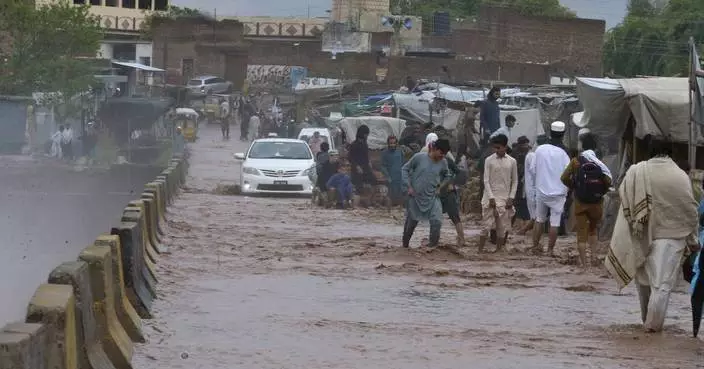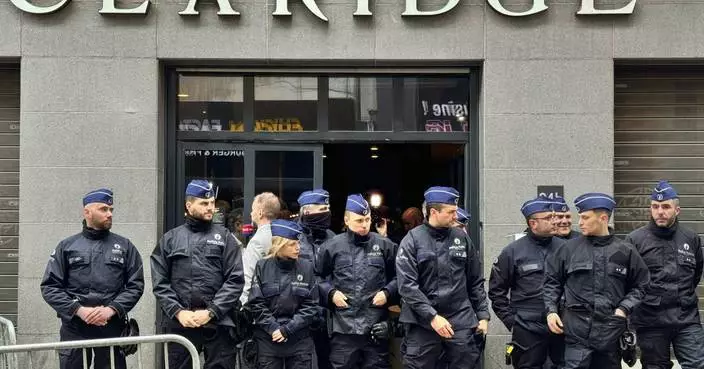Tens of thousands of dead fish have been found on the banks of a lake in a protected nature reserve in northern Greece after high temperatures and drought conditions caused a severe drop in water levels.
State environmental officials said Thursday that the water level at Lake Koroneia has dropped by more than 70% percent in the past three years, to 80 centimeters (31 inches), with the decline triggering the death of carp, sunfish, bleak and other freshwater fish.
Click to Gallery
Tens of thousands of dead fish have been found on the banks of a lake in a protected nature reserve in northern Greece after high temperatures and drought conditions caused a severe drop in water levels.
"Due to the high temperatures, the solubility of oxygen is limited in the body of water that is left," Bobori said. "We have sent samples of dead fish and water for toxicological testing, as high temperatures also give rise to toxicity levels."
The lake is part of the European Union's network of protected nature areas and Greek authorities have launched a long-term effort to try and prevent Koroneia from drying out, employing water diversions, temporary fishing bans, and a crackdown on the illegal disposal of industrial waste from nearby factories.
"The frequency of this phenomenon makes it statistically likely that this is in part driven by manmade climate change."
Dimitra Bobori, an associate biology professor at the University of Thessaloniki and the lake's senior administrator, said dissolved oxygen concentrations in the water had fallen below a critical level, accelerating the deaths over the last week.
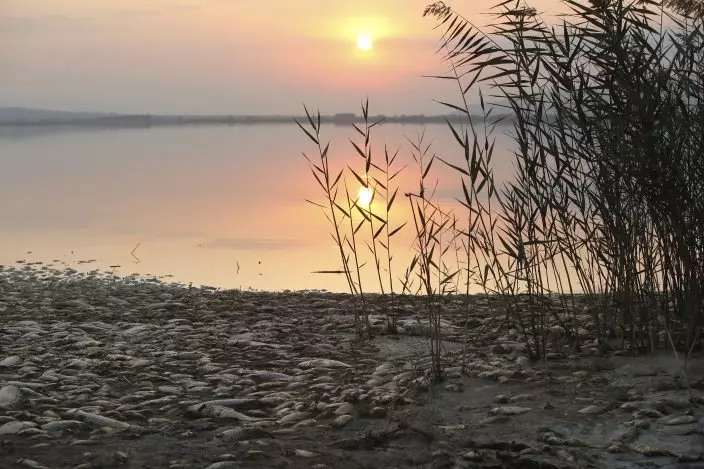
Dead fish lie on the shores of Koroneia Lake in northern Greece, on Thursday, Sept. 19, 2019. Tens of thousands of dead fish are washing up as the water level has plummeted to less than a meter deep (three feet) and the lack of oxygen in the water is leading to mass mortality of everything in it. (AP PhotoGiannis Papanikos)
"Due to the high temperatures, the solubility of oxygen is limited in the body of water that is left," Bobori said. "We have sent samples of dead fish and water for toxicological testing, as high temperatures also give rise to toxicity levels."
Once one of Greece's largest lakes, Koroneia is 30 kilometers (18.5 miles) east of Greece's second-largest city Thessaloniki.
Originally spanning 4,500 hectares (11,000 acres), it has shrunk to about a third of its original size over the past three decades.
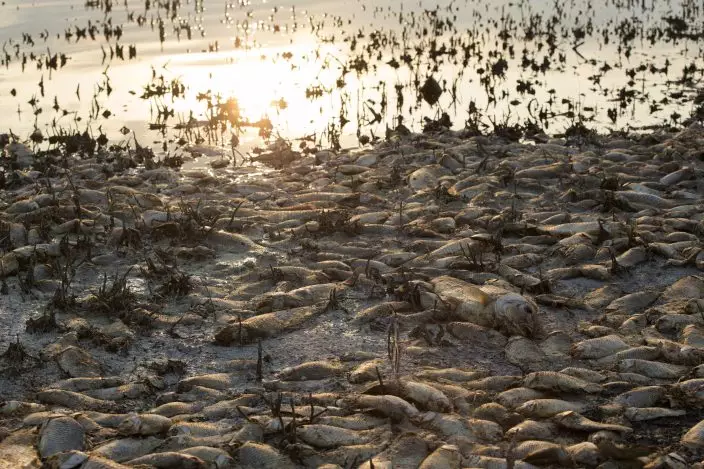
Dead fish lie on the shores of Koroneia Lake in northern Greece, on Thursday, Sept. 19, 2019. Thousands of freshwater fish have been found dead at Lake Koroneia, outside the northern Greek city of Thessaloiniki, after the water level fell sharply due to a drought in the region. (AP PhotoGiannis Papanikos)
The lake is part of the European Union's network of protected nature areas and Greek authorities have launched a long-term effort to try and prevent Koroneia from drying out, employing water diversions, temporary fishing bans, and a crackdown on the illegal disposal of industrial waste from nearby factories.
Water levels had stabilized at about three meters (10 feet) by 2015, but summers are getting longer and hotter.
"Over the last 20 years, there is no doubt that the weather has become hotter in this region, and the trend is worsening," Prodromos Zanis, a professor of meteorology and climate science at the University of Thessaloniki, told The Associated Press.
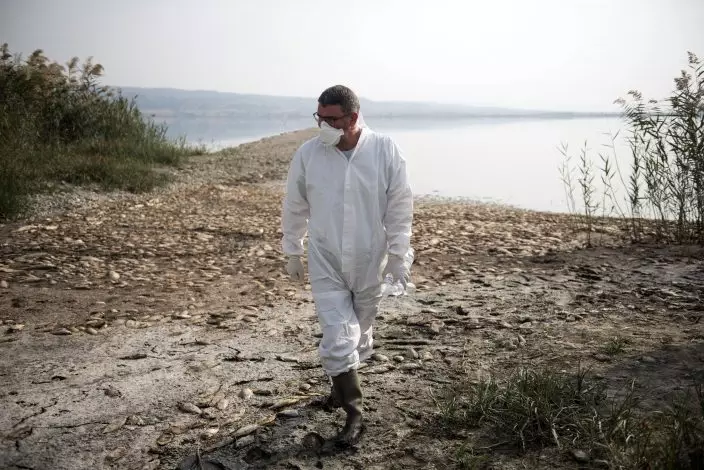
An expert inspects the shores of Koroneia Lake in northern Greece, on Thursday, Sept. 19, 2019. Thousands of freshwater fish have been found dead at Lake Koroneia, outside the northern Greek city of Thessaloiniki, after the water level fell sharply due to a drought in the region. (AP PhotoGiannis Papanikos)
"The frequency of this phenomenon makes it statistically likely that this is in part driven by manmade climate change."
Villages on the banks of Koroneia and nearby Lake Volvi have seen their livelihoods hit by the receding water.
"There are thousands of dead fish near us and the smell is awful," said store owner Nikolaos Rossias, from the lakeside village of Agios Vassilis. "There used to be 10 fish restaurants in the village."
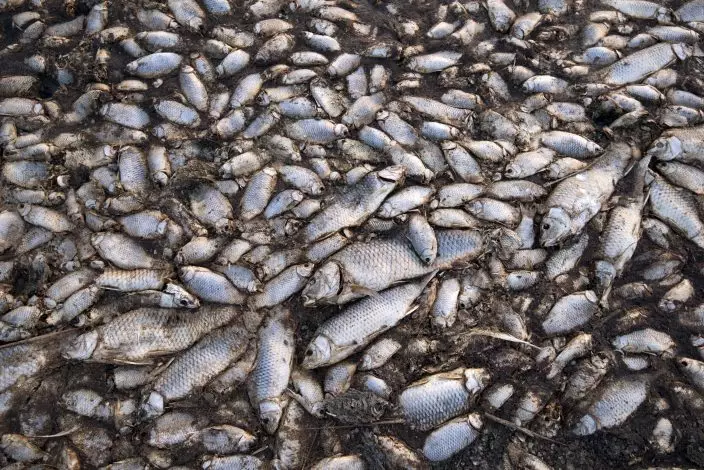
Dead fish lay on the shore of Koroneia Lake in northern Greece, on Thursday, Sept. 19, 2019. Tens of thousands of dead fish are washing up as the water level has plummeted to less than a meter deep (three feet) and the lack of oxygen in the water is leading to mass mortality of everything in it. (AP PhotoGiannis Papanikos)
Now there is only one.
"It feels like nobody cares about the lake ... so many fish have died and our wealth was destroyed."
Follow Kantouris at https://twitter.com/CostasKantouris
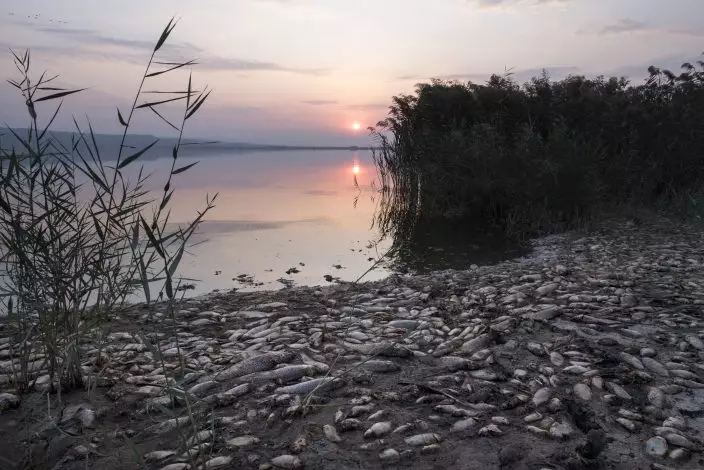
Dead fish lie on the shore of Koroneia Lake in northern Greece, on Thursday, Sept. 19, 2019. Tens of thousands of dead fish are washing up as the water level has plummeted to less than a meter deep (three feet) and the lack of oxygen in the water is leading to mass mortality of everything in it. (AP PhotoGiannis Papanikos)
WARSAW, Poland (AP) — Polish Prime Minister Donald Tusk expressed satisfaction on Monday after a series of candidates supported by his party won weekend races for mayor.
Candidates from his pro-European Union centrist Civic Coalition, or running with the party's backing, won in a series of cities in the second round of local elections held on Sunday, among them Krakow, Poznan, Wroclaw and Rzeszow.
“It is very difficult to clearly say who won and who lost,” Tusk said Monday. “But if we compare these results, especially in the most attractive places, on these attractive battlefields ... then I actually have reasons for satisfaction.”
“Law and Justice has simply disappeared in many places,” Tusk added at a news conference, referring to the main opposition party.
The results put Civic Coalition in a favorable position as the country looks next to elections to the European Parliament on June 9.
Mayors were chosen in a total of 748 cities and towns where no single candidate won at least 50% of the vote during the first round on April 7.
Candidates for Tusk’s party also recaptured cities where they had not held power for many years, including Zielona Gora, Legnica and Torun.
The local and regional elections were viewed as a test for Tusk's pro-European Union government four months after it took power at the national level. Sunday's second round strengthened the Tusk government's leverage in the cities, which should facilitate cooperation on development projects and allotment of EU funds.
Tusk's allies also won in some places in the first round two weeks ago, including in Warsaw, where incumbent Mayor Rafal Trzaskowski was an easy victor.
In the first round, the right-wing Law and Justice, prevailed on the level of regional assemblies in the country's 16 provinces, where it took 34.3% of the votes, while Tusk's Civic Coalition got 30.6%. Law and Justice governed on the national level from 2015-23.
Tusk’s socially liberal Civic Coalition traditionally has strong support in cities, while Law and Justice has a more solid base in conservative rural areas, particularly in eastern Poland.
Civic Coalition is the largest group in a three-party coalition that governs the EU nation of 38 million people. The coalition is pro-European Union but otherwise spans a wide ideological spectrum with left-wing politicians in the Left party as well as conservatives in the Third Way.
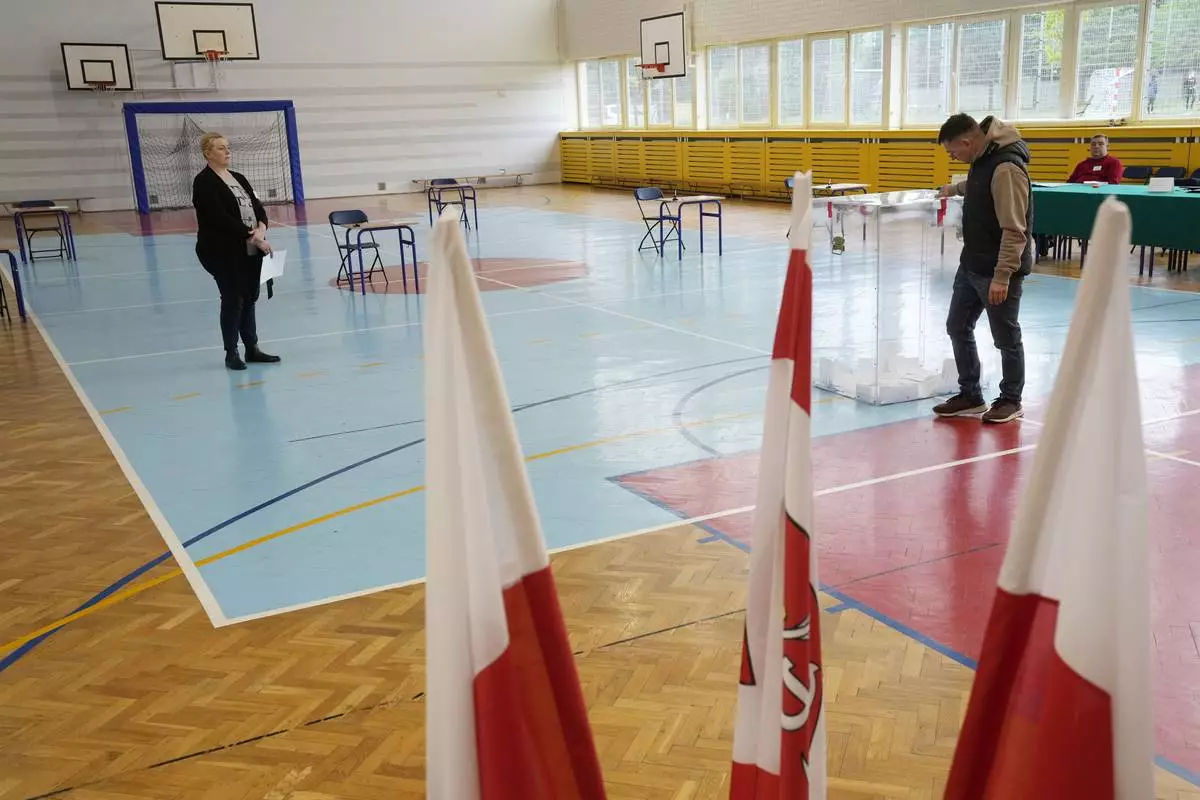
Polish voters take part in a local runoff election in Lomianki, near Warsaw, Poland on Sunday, April 21, 2024. Voters are choosing mayors who did not win outright in the first round of the election two weeks earlier. (AP Photo/Czarek Sokolowski)

Campaign posters promote candidates as Poles vote in local and regional elections in Lomianki, near Warsaw, Poland on Sunday, April 21, 2024. Voters are choosing mayors who did not win outright in the first round of the election two weeks earlier. (AP Photo/Czarek Sokolowski)
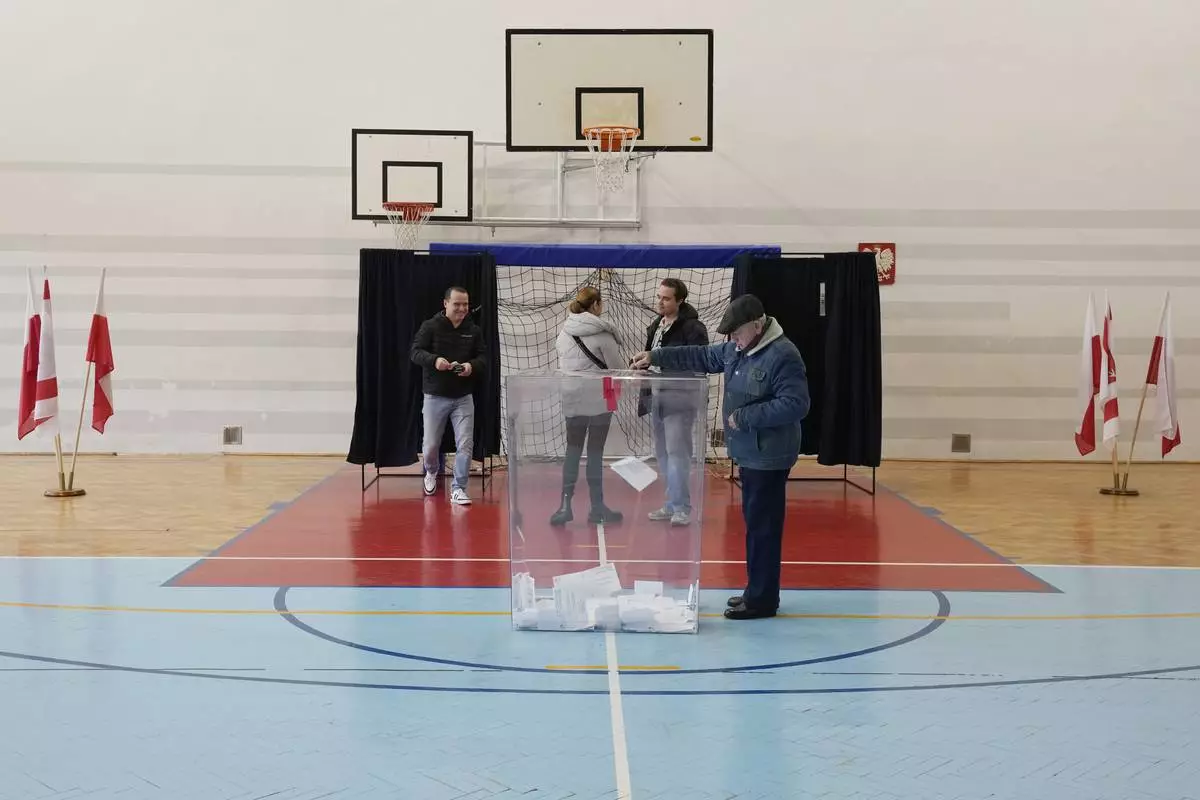
Polish voters take part in a local runoff election in Lomianki, near Warsaw, Poland on Sunday, April 21, 2024. Voters are choosing mayors who did not win outright in the first round of the election two weeks earlier. (AP Photo/Czarek Sokolowski)

Polish voters take part in a local runoff election in Lomianki, near Warsaw, Poland on Sunday, April 21, 2024. Voters are choosing mayors who did not win outright in the first round of the election two weeks earlier. (AP Photo/Czarek Sokolowski)

FILE - Poland's Prime Minister Donald Tusk reacts during his and Ukrainian President Volodymyr Zelenskyy meeting with students in Kyiv, Ukraine, Monday, Jan. 22, 2024. Poland's Prime Minister Donald Tusk is celebrating a victory on Monday April 22, 2024 after a series of candidates supported by his party won weekend races for mayor. (AP Photo/Efrem Lukatsky, File)

FILE - Poland's Prime Minister Donald Tusk listens to the media in Berlin, Germany, Friday, March 15, 2024. Tusk is celebrating a victory on Monday April 22, 2024 after a series of candidates supported by his party won weekend races for mayor. (AP Photo/Ebrahim Noroozi, File)



















